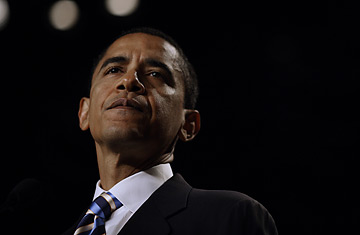
Barack Obama
This past Sunday, Barack Obama gave a speech at the Vernon Park Church of God in Chicago in which he noted that the number of city schoolchildren killed in the last school year was higher than the number of soldiers from all of Illinois killed in Iraq over the same period. "From South Central L.A. to Newark, New Jersey, there's an epidemic of violence that's sickening the soul of this nation," the Illinois Senator told the crowd. "The violence is unacceptable and it's got to stop."
Obama didn't invent this analogy. In June, Chicago Mayor Richard Daley made a similar point, comparing the annual toll of nationwide gun deaths to Iraq casualty figures, and wondering what happened to the outrage. Right-wing bloggers have used the same data to make a different point: that the media is hyping the number of casualties in Iraq, since the total is still small compared to, say, the number of annual homicide victims in the U.S.
But stripped of agenda, does this curious comparison mean anything at all? Is it really possible that Chicago is more dangerous than Iraq?
Comparing absolute numbers of murdered schoolchildren in one place to absolute numbers of dead soldiers in another is problematic, to say the least. During the 2006-07 school year, 34 kids were killed in Chicago. The death of 34 children is morally reprehensible, but if we are going to turn tragedy into a data point, we may as well use a slightly — though only slightly — more rational denominator. In other words, 34 out of how many? We could compare those 34 deaths to the total number of children in Chicago, but since most shooting victims are teenagers, it might be more relevant to consider the total number of public high-school students (109,982). By that measure, about .03% (or three out of every 10,000) of Chicago high-school students were killed last school year.
OK, what about the Illinois soldiers in Iraq? Obama didn't offer specific numbers, but his technical point turns out to be correct. Between 24 and 28 military members from the state (depending on which of the many available sources we rely on) were killed during the 2006-07 school year. Thats fewer, in absolute terms, than the number of kids killed in Chicago. But Obama was wrong on the relative victimization of both populations: the number of dead soldiers represents about .3% (or 30 out of every 10,000) of the total number of active and reserve troops from Illinois currently serving in Iraq and Afghanistan, according to Defense Department statistics.
So there you have it: Illinois soldiers in Iraq are still 10 times more likely to be killed than teenagers in Chicago. Well, that's a relief — the same way it's a relief to discover that your brother's terminal illness is progressing more slowly than your father's.
And yet, the math doesn't render Obama's Chicago-Iraq analogy totally null and void. On the one hand, the point is statistically unhinged, like comparing the GDP of different countries without knowing the currency. On the other hand, politics isn't math.
Obama did make a legitimate point about how we value one set of victims over another. The Washington Post runs a regular feature called "Faces of the Fallen" for U.S. military casualties, but no such feature exists for the steady accumulation of teenage corpses in the District of Columbia. "He's saying something true, regardless of how you slice through the statistics," says Dan Kahan, a Yale Law professor who has spent years studying how Americans perceive gun risks. "It's a salient way to bring people's attention to an empathy deficit. The failure of this group [of Chicago school kids] to register tells us something about ourselves."
Does it tell us that we don't value young inner-city kids as much as soldiers? Yes, but like anything involving guns, nothing is that simple in America. One reason more people aren't outraged about the deaths of schoolchildren is that they don't know how to fix it. As Kahan and others have found in repeated studies, Americans see guns not through a lens of 20/20 facts but through an elaborate stained-glass window. Are you a big proponent of authority? If so, you probably see guns as a way to make the world safer — as a form of protection against evil deviants. Same goes for people whose identity is rooted in self-sufficiency. You see guns as a form of independence. So gun-control laws will not fix the problem, as far as you're concerned. But if you are more egalitarian — that is, inclined to distrust authority and believe everyone should share the wealth — studies show that you probably think gun control laws are a good idea and find the Iraq analogy quite apt.
Obama and Daley used the analogy to call for better gun-control laws. But this kind of call for outrage is only likely to resonate among those who are already outraged. "Cultural worldview," squishy as the concept may be, matters more than anything else when it comes to the most divisive issues — more than whether you are black or white, male or female, southern or eastern, urban or rural, conservative or liberal.
Given that profound disconnect, the Baghdad-in-Chicago analogy is tactically limited, as well as mathematically flawed. Of course, at this stage of the race, politicians are not necessarily looking to convert anyone. They are looking to mobilize their base. And indeed, Obama's speech got him a standing ovation at that church in Chicago. So we can expect to hear more such analogies — right up until the primaries are over. Then the math may get even fuzzier.
